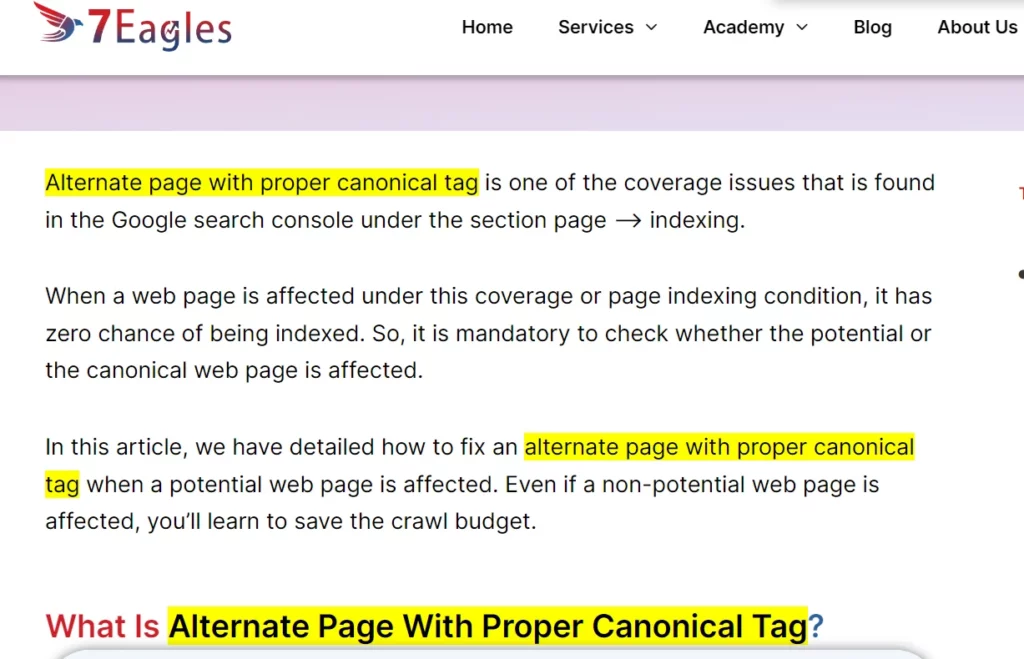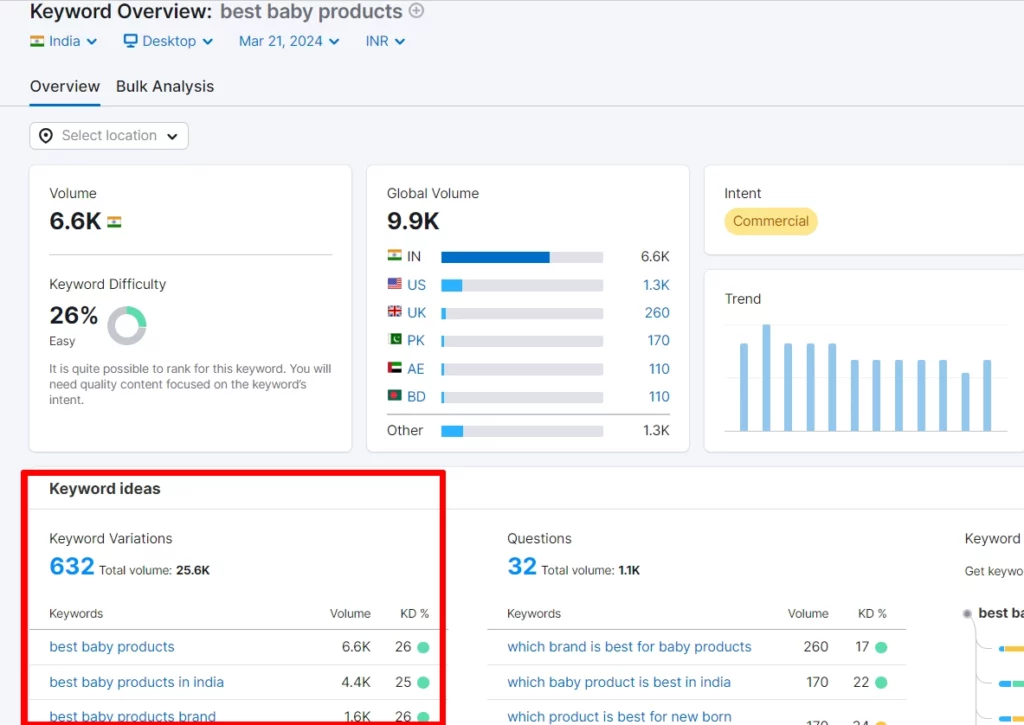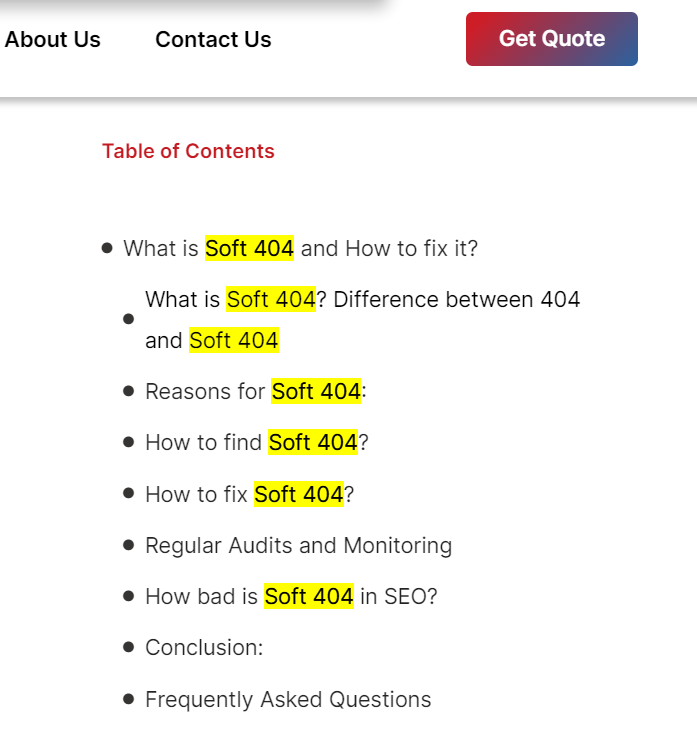Keywords are a crucial factor in Search Engine Optimization. If you need some information or have doubts about a topic, you search for it on Google, and the search engine brings your answer, have you ever wondered how Google brings you the answer, it’s because of SEO.
The query or question you typed is called a keyword, SEO Professionals will optimize the business website based on the keywords.
For example, typing “best baby products” on Google brings you tons of results with the exact words you typed.
Here “best baby products” is the keyword and the websites shown on Google are optimized for this keyword.
Now you have understood what a Keyword in SEO is, Further down we will discuss what is Keyword density in SEO.
What is Keyword Density?

Keyword Density is an SEO metric that calculates the total number of times a keyword appears on your webpage compared to the total word count.
It is often expressed as a percentage. Keyword density is calculated by dividing the number of keywords on the page by the total number of words and then multiplying that number by 100.
Keyword Density= (Number of Keywords /Total Number of words) *100
Example:
If you have used the keyword 10 times in a 1500 words webpage then the keyword density is calculated as
Keyword Density= (10 /1500) *100 = 0.6
So, 0.6 is your keyword density score, This is a way to calculate the keyword density of any webpage.
Another method to evaluate keyword usage is TF-IDF, short for “term frequency-inverse document frequency”.
It compares a keyword’s frequency on a page (TF) to its frequency across multiple pages on your site (IDF). This defines the keyword’s relevance to specific pages.
For example, a page about “healthy recipes” should have a higher TF-IDF for “healthy” than a page discussing “car maintenance”.
Further, we will discuss why keyword density is important for SEO, what a is good KD score and what are the best practices of keyword density.
Is Keyword Density Important for SEO?
No, Keyword Density is not relevant to SEO as it is not considered a ranking factor anymore according to John Mueller, a Search Advocate at Google.

Modern search engine algorithms have evolved to focus more on overall content quality, relevance, and user experience rather than just keyword frequency.
While maintaining a reasonable keyword density can still be beneficial, it’s more important to prioritize natural and relevant content that provides value to users.
Focusing more on keyword density can lead to keyword stuffing, harming a website’s ranking instead of improving it.
How Much Keyword Density Is Good for SEO?
A good keyword density Score possibly be 1-2%, according to some SEO professionals. But there is no specific score for keyword density according to Google.
You can use your keyword naturally in the content if it helps the user, if possible you can also use keyword variants or related keywords on a page.
Google search engine algorithms are sharp enough to know the exact intent of the keyword on a page.
Remember, the keywords you use should not annoy the users and search engines as well. If users get annoyed they will leave your website and if search engine gets annoyed it lowers your ranking in SERP results.
Best Practices for Keyword Density
Though keyword density is not important, we should not avoid it completely, there are 3 best practices to implement it.
1. Integrate Keywords Naturally in Content
Google always focuses on natural content which helps their users, so try to integrate keywords naturally in the content
The Biggest SEO myth in the olden SEO practice is to consider keyword density score for better ranking, but this is not true. Keyword density is just a metric to analyze how you convey your context to search engines, so do not bother with it much.
Use keywords in appropriate places that you think are necessary for users and it should not annoy them.

Here is an example from one of our blog post in technical SEO “Alternate Page with proper canonical Tag” which was naturally integrated keywords in the content.
2. Use Related Keyword Terms
Related Keywords are the ones that have the same intent as the main keywords. You can use it in the content as Google will not consider it as keyword stuffing. It is also called Semantic Keywords.
It is crucial to do Keyword research so that you can analyze the search volume of related keywords, which helps in ranking.
Another topic related to semantic keywords in SEO is Keyword clustering, It is the process of collecting related keywords into groups.

This is an example of the related keywords show in the Semrush tool for the focus keyword ‘best baby products‘
There are many best keyword clustering tools available and they help in researching appropriate keywords for your content.
3. Plan Keyword Placements
Keyword placements help search engines understand the context of the webpage. You can use keywords in three places efficiently
- Place it in your titles
- Place it in your headings and subheadings
- Place it in captions from images
Let me explain to you with the same example using the keyword” best baby products”
1. Place it in your titles
Titles should have the exact keywords, using keywords in titles helps search engines and users to understand what your content is about.
Example: Your title could be “ Best Baby Products for Winter Season”
2. Place it in your Headings and Subheadings
Adding keywords in headings helps to organize your content and make it easy for users to read, you can add the keyword in H2, H3, H4, etc.
Example: you can add “10 Best Baby Products “in Heading 2 (H2) and explain the content.
3. Place it in your Images
Add keywords in the image caption or as alt-txt when you are uploading images to the blog.
Including keywords in image captions helps search engines understand what the images are about and there are high chance that your images appear in the image search feature of Google if they contain the exact keyword.
Example: When you are uploading the reference baby products in the content, add alt-txt as “ best baby products” in the backend.
Here in our blog content discussing Soft 404 errors and their resolutions, you’ll notice that we’ve naturally placed the keywords into titles and headings, improving the overall quality and SEO effectiveness of the content.

Wrap Up
Keyword density is not an important aspect of SEO in terms of ranking factors, but it is important to have an eye on keyword placements and related keywords, and as simple as that use keywords naturally in the content which helps users and search engines to understand the context of the blog.
Frequently Asked Questions
The keyword density score should be 1-2% according to some SEO professionals, but there are no such specified metrics as the keyword density is no longer the ranking factor.
Keyword Density is the metric that measures the number of keywords used on the webpage concerning the total number of words on the page.
You can place the keywords in Titles, Headings, Subheadings, and Images of the webpage.
Keyword density score will not impact the search engine rankings, To improve your search rankings, use keywords naturally in the content as it helps search engines and users to understand the content, and avoid keyword stuffing as well.













